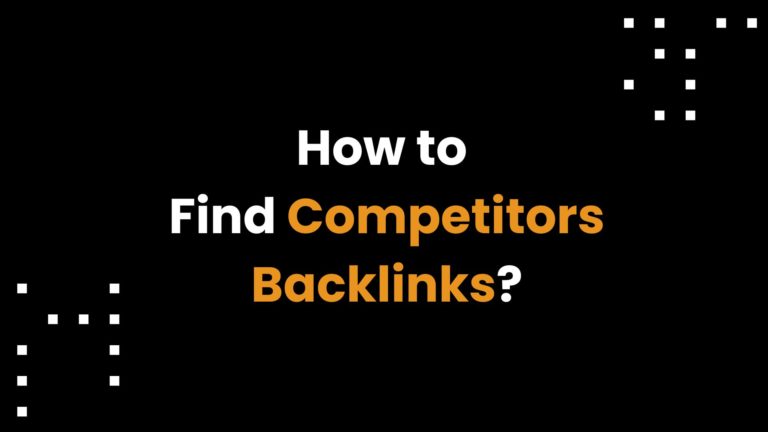We are thrilled to present results from our SEO survey proceeded at the end of 2018. Overall, more than one thousand respondents working in marketing and focused on SEO answered 27 of our questions. Thanks to them we could draw a picture of SEO landscape globally.
The aforementioned survey gave us, among others, these exciting results:
- On average 46% of the respondents’ time spent on SEO in general, is dedicated to the construction of links.
- For every dollar spent on SEO tasks, 0.45 cents respondents invest in the construction of links.
- 63% of respondents prefer paid sponsored articles to obtain quality links.
- 53.10% of respondents think that the construction of links influences more in the position of the page than the optimization of the site.
- 45.48% of respondents do not prove the effectiveness of their methods for the construction of links.
Eager to find out more of our results? Keep reading!
At the end of November 2018, we carried out the global survey on Link Building with the greatest participation in history, comparing similar surveys conducted by Semrush (628 responses in 2017) or MOZ (435 responses in 2016).
We conducted the survey in 4 languages: Spanish, English, Polish, and German, globally we obtained 1161 unique responses* in the survey.
As we wanted to reach people who work with SEO every day we encouraged marketers around the world to join our survey! We managed to gather companies’ owners, freelancers as well as SEO team members. Therefore experienced responders could unveil their practical insights and plans for the future in terms of SEO, especially in the topic of link building.
*This is the number after omitting unrelated or very low-quality answers
Results of the 2018 Link Building Global Survey
Before moving on to the results, we want to emphasize that each person who participated in the survey was given a gift package by Linkhouse and by our partners such as SurferSEO, Senuto, SEO Planner, Brand24, UXfeedback. us, Sembot.io, Callpage, Unamo, Clusteric, PushPushGO, Semstorm, Kontentino, Bowwe , and Honaro. A huge thanks to all respondents and our survey’s partners! We made it happen together!
In the following summary of the survey, you can find out brief analysis divided into 8 sections.
Table of Contents:
- Demographic view
- Resources – money and time, and link building
- Sanctions and link building
- Sources of knowledge on the construction of links
- Factors that are taken into account when evaluating the quality of links
- Tools used in the construction of links
- Link building strategies and tactics
- Onsite vs offsite
Demographic Vision
Who participated in the survey?
In this first global Link building study, we were able to obtain 1,161 unique responses from people around the world (number of responses after omitting unrelated or very low-quality answers). Find out more about our respondents!
The countries for which link building activities are carried out are distributed as follows: Poland, Spain, the United States, and the United Kingdom are the countries where the respondents perform the most link building activities.
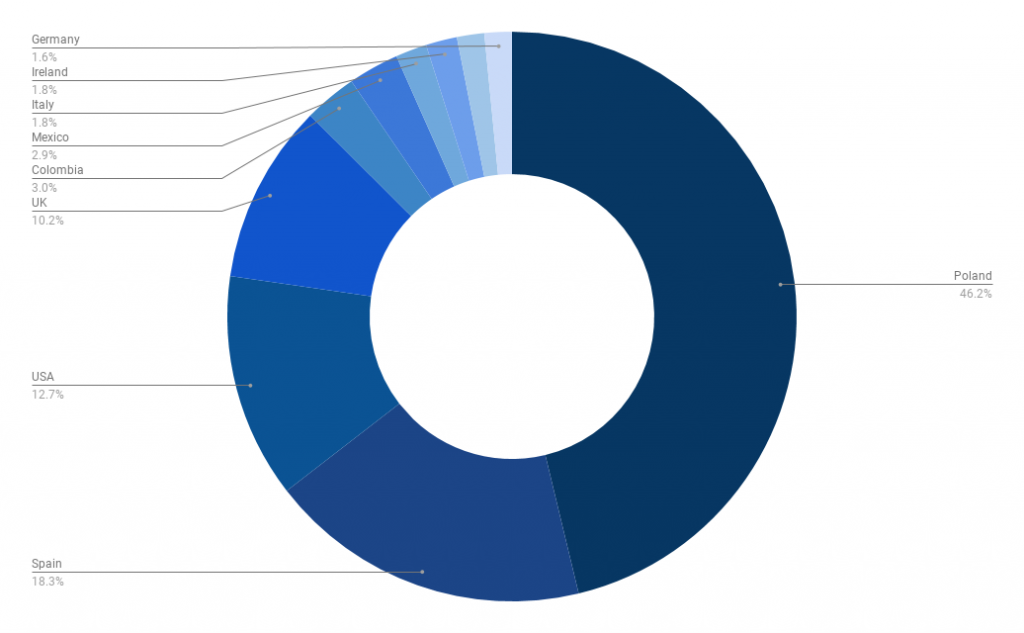
In order to better know the respondents and be able to draw more valuable conclusions from their answers, we asked questions about the professional situation, seniority in the SEO world and the number of employees of the companies in which they work.
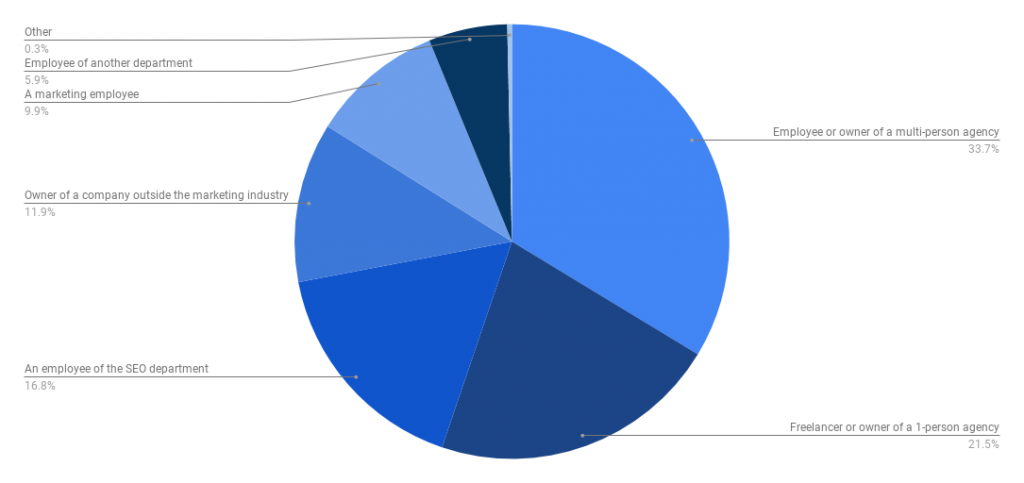
33.90% of respondents work in a micro company (2-10 people), while people who work in a large company (more than 200 people) are 3.36% of respondents. The 28.51% of those who answered the survey are freelancers or owners of their own company.
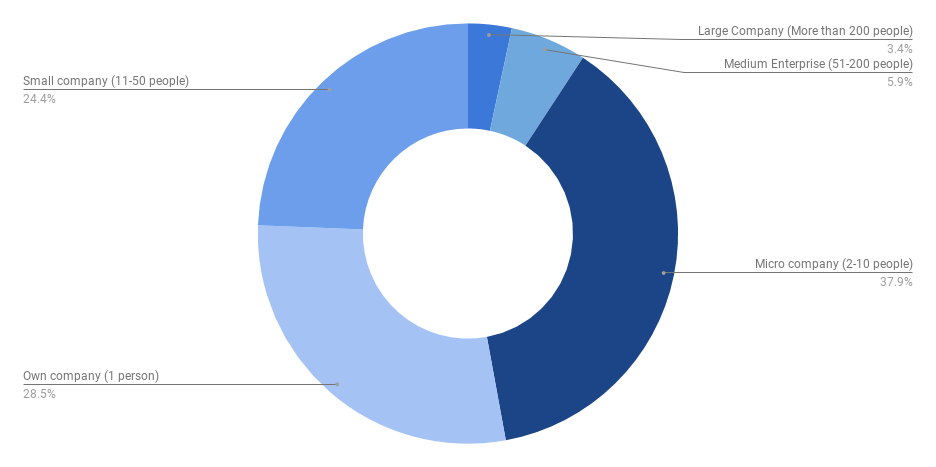
What kind of SEO experience do you have?
While analyzing the given results it is essential to highlight respondents’s years of experience in SEO. More of them (48,3%) declare from 1 up to 3 years of gaining SEO know-how. Respondents with 4 to 6 years of working with SEO are 21,3 % off all of the people who answered our questions. The percentage with the most experienced group (more than 6 years of working in the field) is over 1/4 of all respondents (over 27%) What is important is that we omitted people with no experience in SEO activities, so that our result can be more precise and useful.
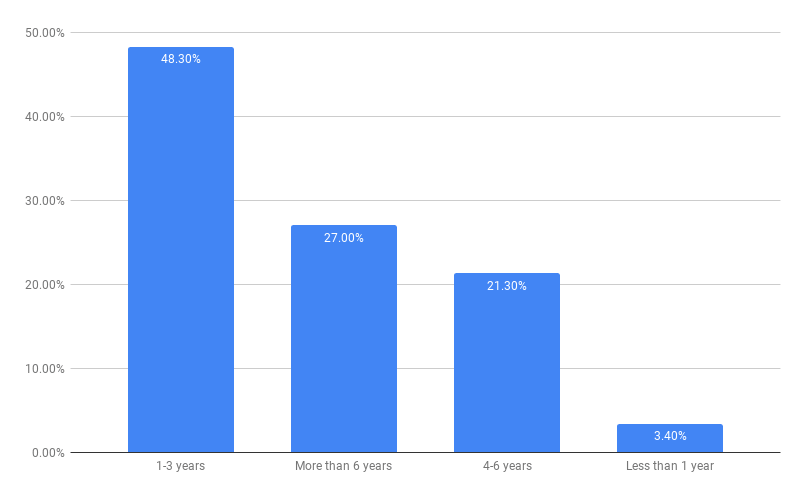
Resources – money and time, and link building.
We can divide SEO activities into two groups: on page and off page. First means everything what you can do on your website to improve its position in the browser results. When it comes to the second one the huge role plays link building (backlinks to your pages from the external websites). To get the best results, SEO experts work on both aspects.
What monthly budget do you have for link building activities?
One of the metrics which can show a scale of link building activities is the budget.
The average monthly budget for the construction of links is 624.78 US Dollars, this is much higher if we compare only with the Spanish-speaking countries in which the monthly budget is 529.48 US Dollars. It is worth mentioning that the median is 210.14 US Dollars.
Interestingly, the SEO agencies are the sector that has a lower monthly budget for the construction of links with 564.44 US Dollars on average. The employees of the SEO departments in companies have the most monthly budget with 916.87 US Dollars on average.
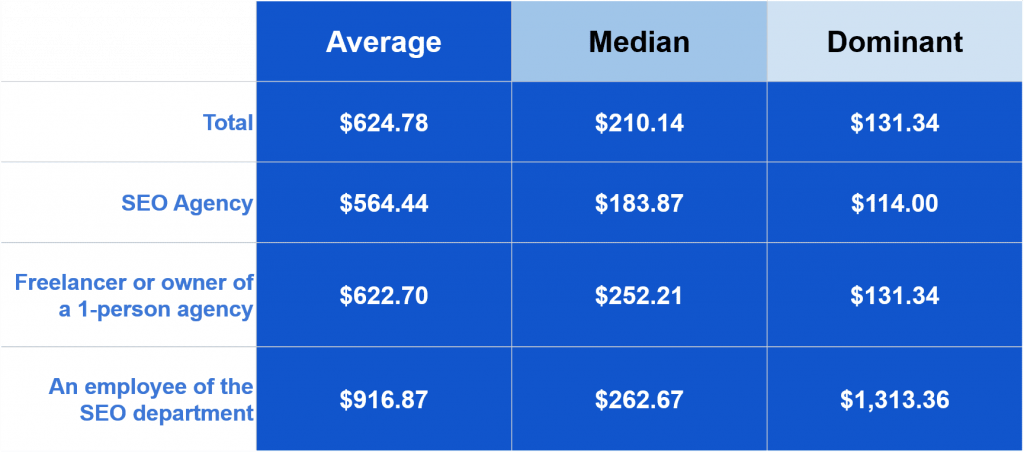
What percentage of the entire SEO budget is spent on building links?
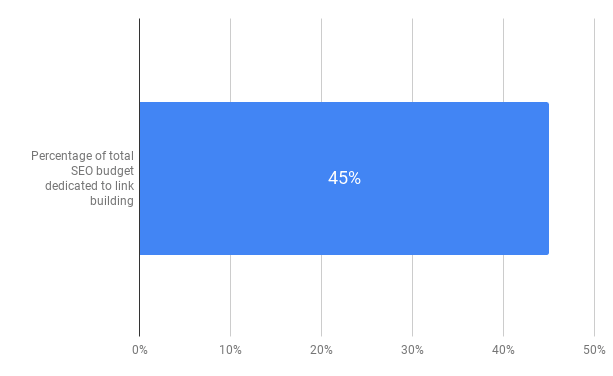
On average 45% of the SEO budget goes to the link building, that is, for every dollar spent on SEO tasks 0.45 cents are dedicated to the construction of links. This shows how significant is acquiring backlinks in todays marketing world.
What percentage of SEO time is spent on building links?
Analyzing the results, on average 46% of the time is dedicated to the construction of links. We can not forget, that link building is time-consuming, because it requires finding the best publishers and sites for quest posts, pitching them and content creation.
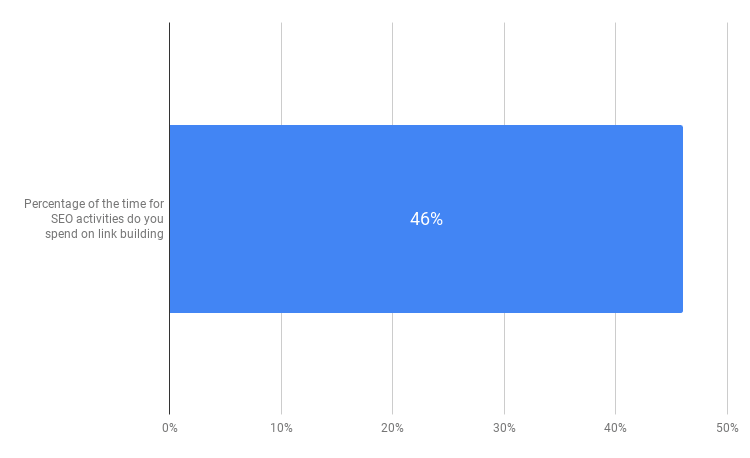
How will your budget for the construction of links change in the next year?
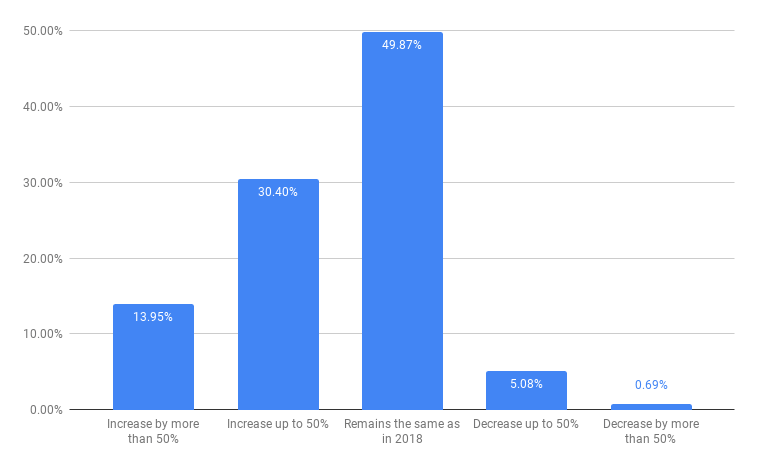
44.35% of people say that their budget will increase compared to 2018. Almost 50% of respondents say that the budget for the construction of links will remain the same as in 2018. Only 5.15% of respondents will decrease their budget in this area.
If you do not want to stay behind your competition you need to intensify your link building activities in the near future.
Sanctions and Link Construction
In the last 12 months, has any domain in which you have worked received any sanction from Google for the construction of links?
If you look at the results below, keep in mind that the % does not refer to the penalized pages, but only to the people. Most SEO specialists work on different websites at the same time. If any of those was penalized, it was enough to answer “Yes” to the question.
7.92% of respondents have received some penalty from Google related to the construction of links in any of their sites
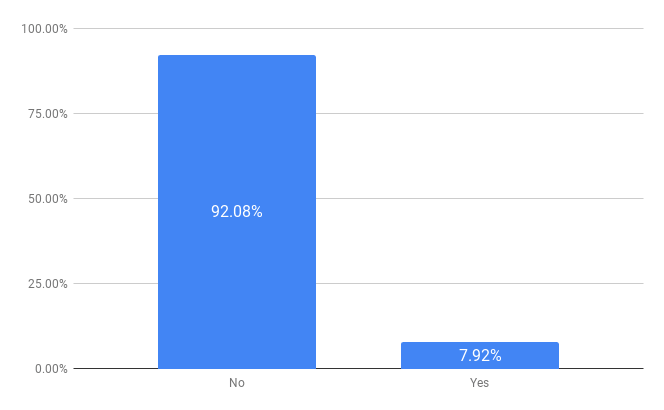
- The group that received the highest penalties were the multi-person SEO agency, while the owners of some company outside the marketing area were the group that received fewer penalties.
- The group that received the highest penalties were people who have between 1 and 3 years of SEO experience.
- 17% of people who spend less than the total monthly average for the construction of links (624.78 US Dollars) have received some penalty.
Sources of knowledge about the construction of links.
While working with SEO marketers needs to regularly educate themselves on the changes in algorithms as well as find out best solutions on their own. Check out what are the best sources of knowledge when it comes to SEO and how many marketers actually optimize their activities in this area.
Are you testing the effectiveness of the different link building methods in your company?
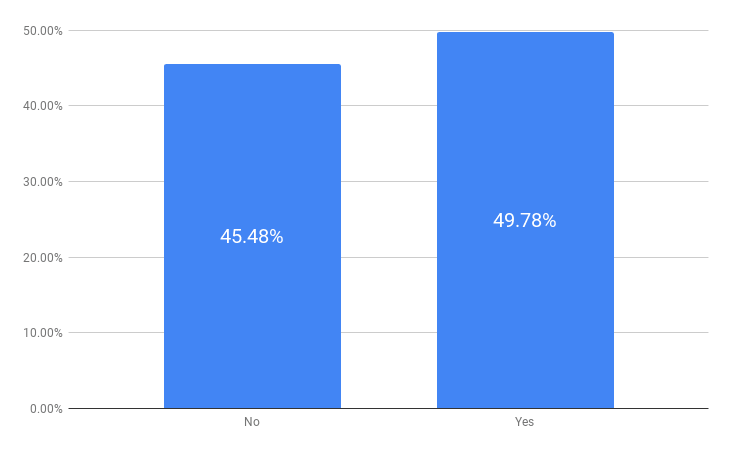
In general, 45.48% of respondents do not prove the effectiveness of their methods for the construction of links.
The employees of the SEO department are the group that proves the most the effectiveness of their methods for building links with 60%.
Who does NOT perform link effectiveness tests?
59% of employees outside the SEO department but who perform link building tasks, do not prove the effectiveness of their methods for the construction of links.
79% of people with less than 1 year of experience do not prove the effectiveness of their methods for building links. Comparing with this the people with more than 6 years experience in SEO are the group that most check the effectiveness of their links with 64%.
The above results does not surprise. People who work in the SEO departments and with the longest experience prove their activities’ effectiveness. To join the most qualified SEO experts – test and optimize your link building.
From what sources do you learn about the construction of links?
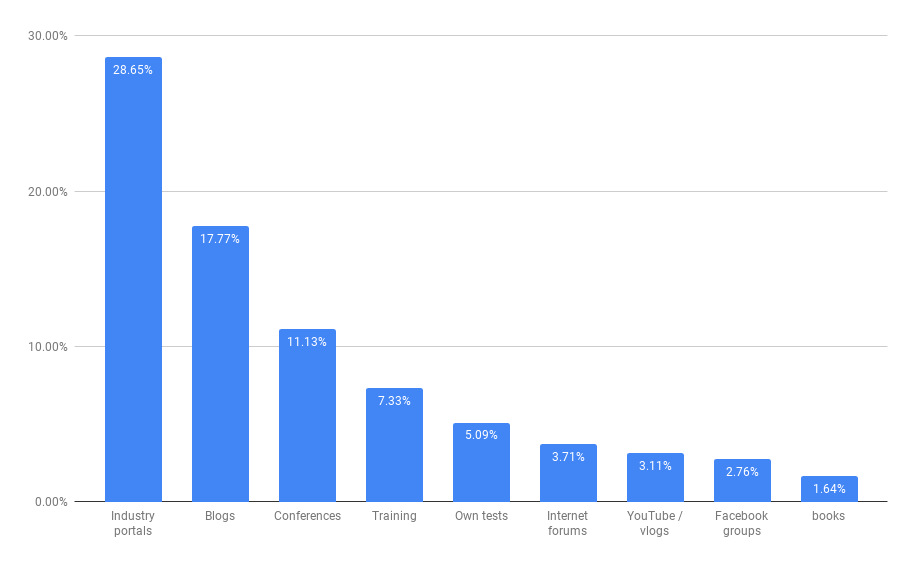
This was an open question during the survey. Most of the indications are industry portals, blogs, and conferences. Internet forums are more relevant than YouTube channels or groups on Facebook.
The books were the source with fewer answers as a means to learn about link building.
The most frequently mentioned sources were:
- Blogs: Search Engine Land, MOZ, Neil Patel, ahrefs, semrush
- Podcasts and webinars were mentioned multiple times, which did not happen in the survey in Spanish-speaking countries.
As you can see, the most popular sources of knowledge are ones that can be updated regularly. Because of the actual character of SEO industry – it can be resultful to follow aforementioned blogs and events.
Factors that are taken into account when evaluating the quality of the links.
What indicators or parameters do you take into account when assessing the strength of a given link and which is the most important?
Among the SEO indicators, the most important are: visibility of the domain in Google, the theme of the domain and the subject of the subpage that is linking.
The authority of the domain (Domain Authority) is an important aspect to consider by the people who answered this survey, but it is not the most important factor.
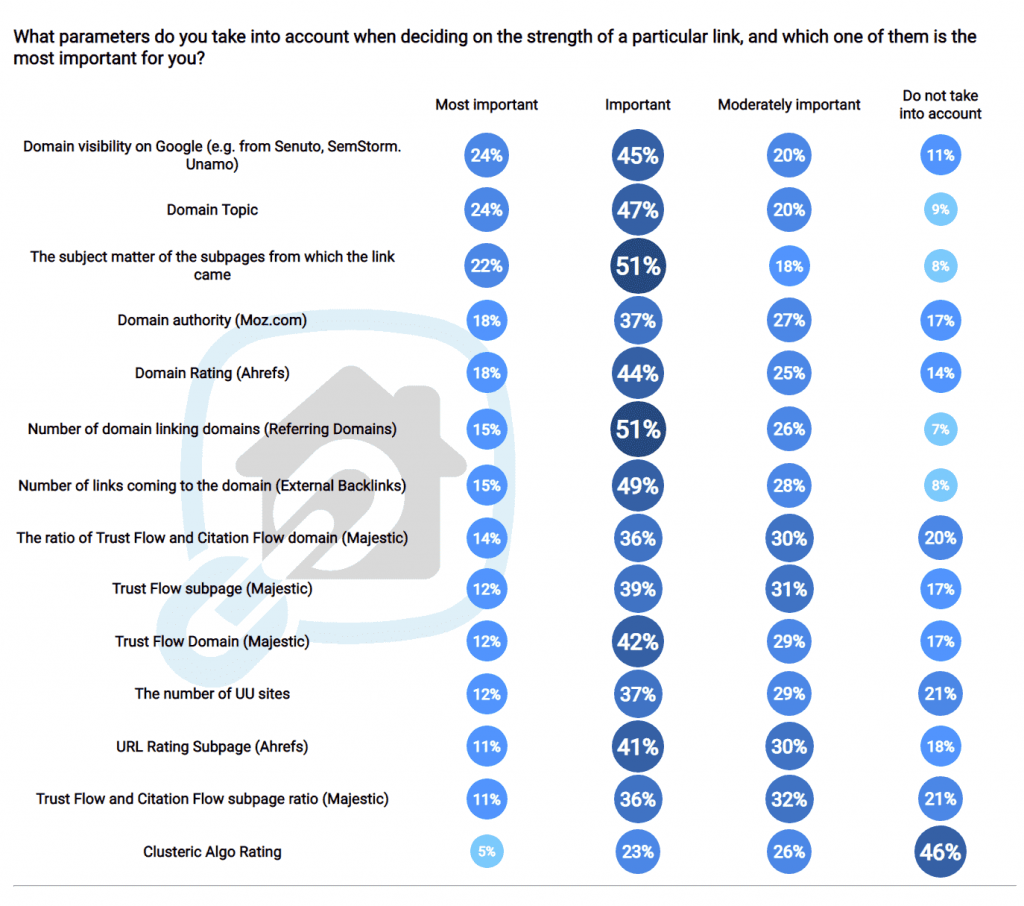
Taking into account only the “Most important” and “Important” answers, the 3 most relevant factors are:
- The theme of the portal.
- Visibility on Google
- Website traffic
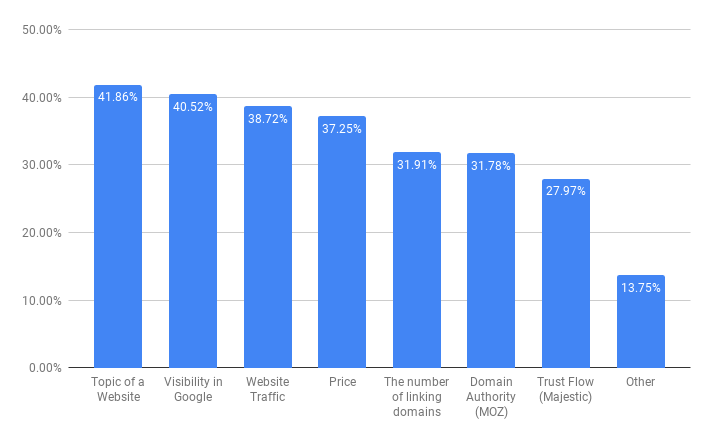
Taking into account only the aspect as “The most important” – The theme of a website is the winning factor
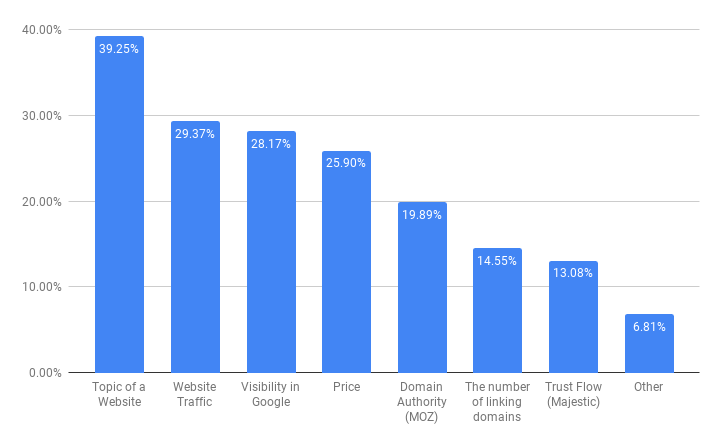
Tools used in the construction of links
What tools do you use in the link building process?
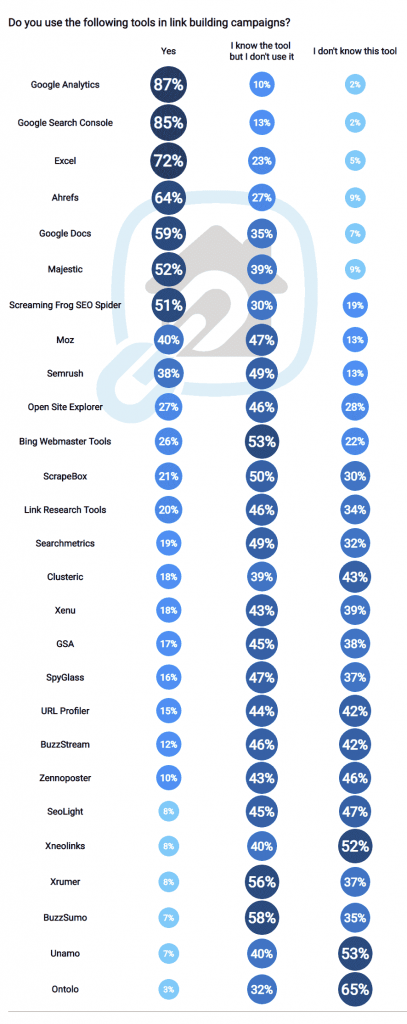
The most used tools in the whole process of link building are Google Analytics, Google Search Console, Excel and ahrefs.
The tools less known to the respondents are Ontolo, Unamo, and BuzzSumo.
Link building strategies and tactics
This section is possibly the most interesting section for all readers since the techniques and strategies most used during the link building process are discussed.
What methods of obtaining links do you use and in what situations?
We collect the 20 most popular link building tactics and ask participants what and in what situations they use. The results are classified from the most popular (use at any level of link building) to the less popular forms.
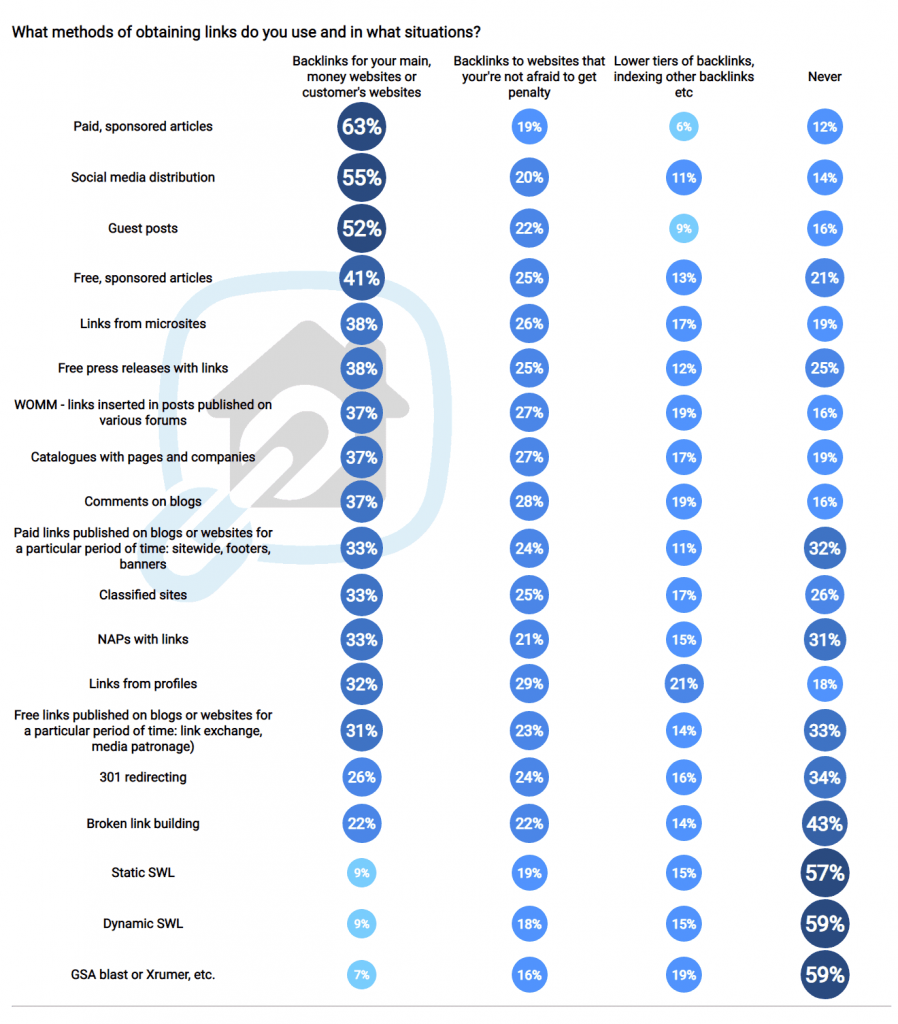
The most popular way to build links that people use in pages positioned by their clients are: paid sponsored articles, links on social networks, and guest blog posts.
GSA Blast, Xrumer, along with the creation of automatic links either dynamically or statically is the least used techniques.
Which links do you find most effective?
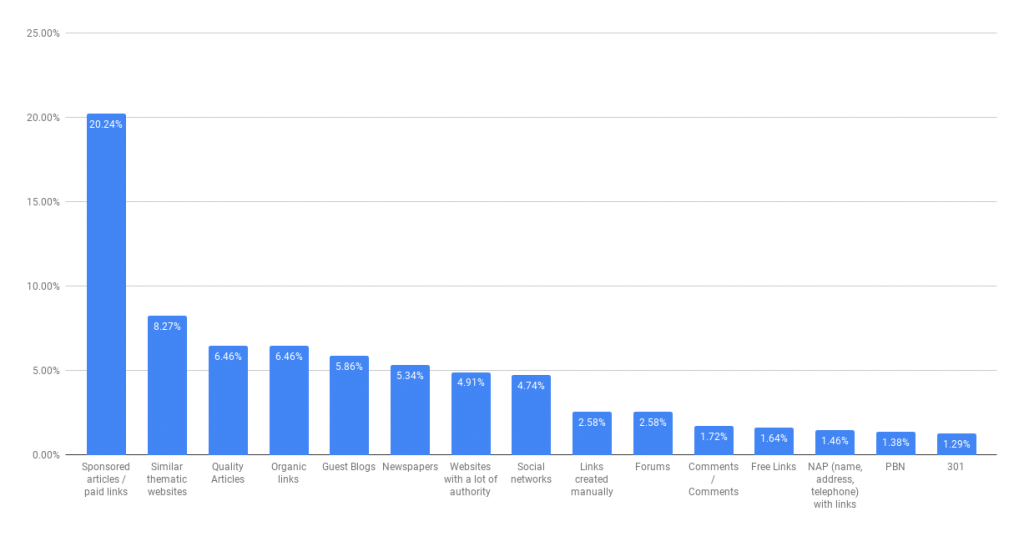
The majority of respondents say that the most effective technique is through sponsored articles or purchased links, followed by linking to similar websites and linking to high-quality blogs or portals.
Links 301 and PBN are the least effective methods among respondents.
What distribution of anchors do you use?
We asked about the use of different types of anchors (link types) and their participation in the link profile. The most popular usage ranges:
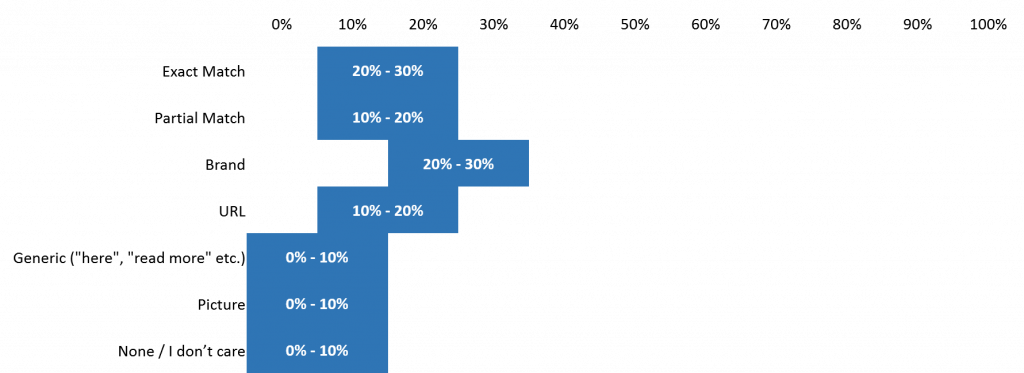
Most respondents prefer to anchor the brand.
Do you create links that lead directly to a page positioned from sites in other languages?
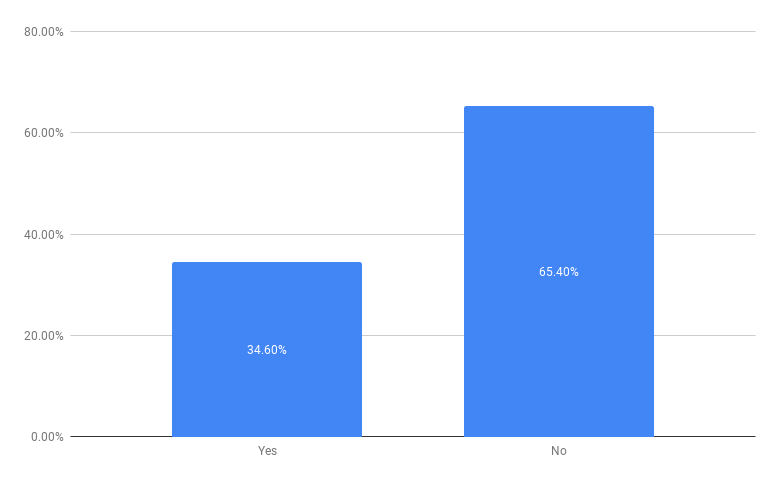
The acquisition of links from foreign websites (pages in a language other than the domain to which the link carries) is an increasingly popular way to link in the industry.
34.60% of respondents say they link to foreign websites.
Do you index the links obtained? If so, how?
32.61% of the respondent’s index the links obtained on their websites.
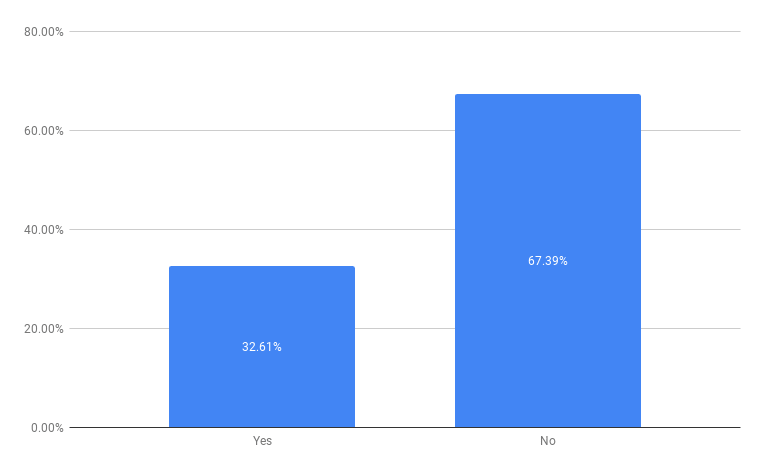
Most people who index purchased links do so through Google Search Console or through payment tools. It is curious that several of the respondents decided not to share information about the techniques they use.
What is the biggest problem with link building that affects you now?
This was an open question answered by 754 of 1,161 people. Among the most common problems faced in the link building process is:
- Low budget
- Lack of customer/product knowledge
- Do not find sites with the same theme
- Lack of time
- Spam links
- Fear of some Google penalty
- Low quality of websites
Onsite vs offsite
Which factor do you think has the most influence on the position of the page in the search results? The optimization of the site or the construction of links?
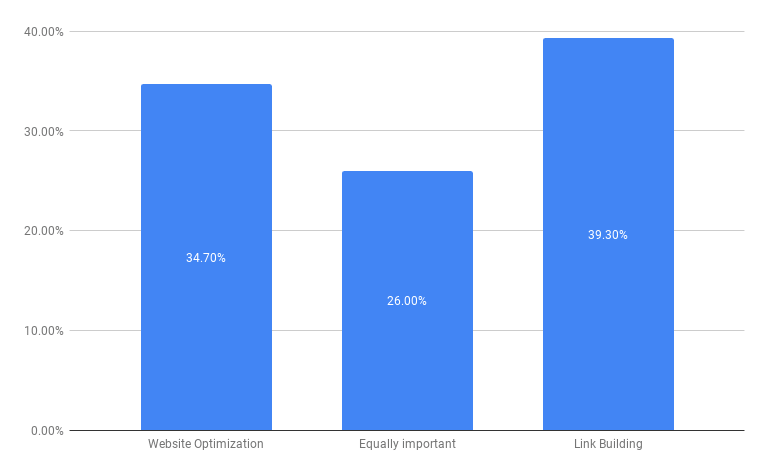
The majority of the participants (53.10%) think that the construction of links influences more in the position of the page than the optimization of the site.
By dividing the results into page optimization, link building and evaluating both elements as equally important (we get the following results):
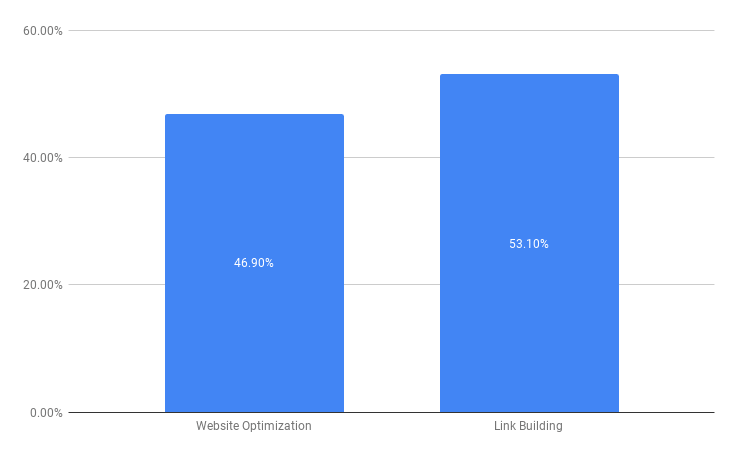
26% of people think that both factors are equally important. But the construction of links is the most important aspect (39.30%) compared to site optimization.
What questions were missing in this survey?
The suggestions by the respondents were minor, but we realized that there are still many areas to improve.
Some questions may be shortened so as not to lengthen the time needed to complete the survey. In next year’s edition, you can expect even more detailed questions and linking tactics.
We invite you to leave your comments in relation to the results of the global link building 2018 survey. We will gladly read your comments, opinions, and recommendations and discuss these aspects with you!








